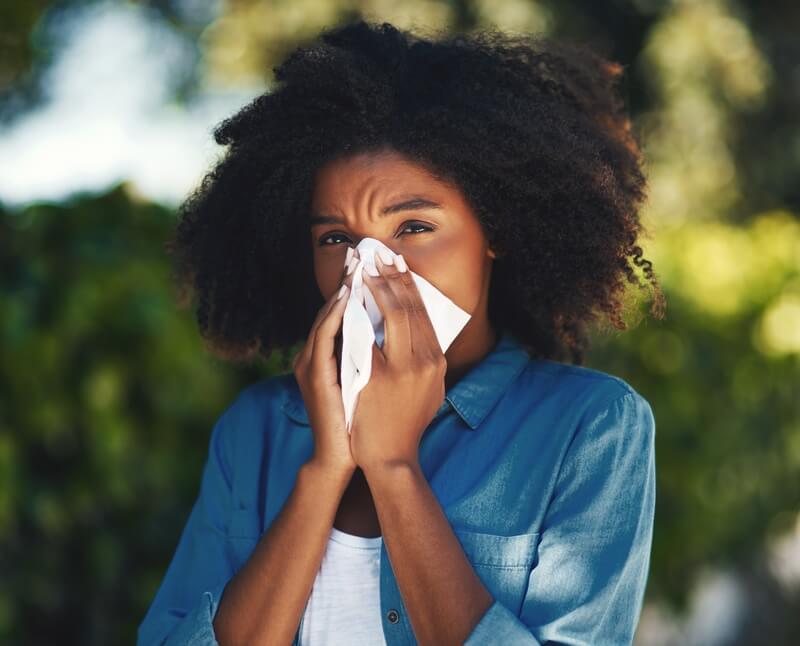
Asthma, also known as bronchial asthma, is a lung disease. With asthma, your airways narrow and swell and get blocked by excess mucus. You can use different medications to treat these symptoms.
Basics of Asthma
Asthma is a disease that impacts your respiratory system. It is a chronic condition, which means you can’t get rid of it, but you can learn how to manage it.
Over 25 million people in the United States have asthma. The consequences of asthma can be life-threatening if you don’t have the proper medications to treat it.
What Happens During an Asthma Attack
Three different things happen when you have an asthma attack:
- Inflammation: The lining in your airways becomes swollen, which constricts the amount of air that comes in and out of your lungs.
- Bronchospasm: The muscles surrounding your airways become tight and constricted with bronchospasm. This prevents air from flowing correctly.
- Mucus production: Your body produces extra mucus during an asthma attack. The mucus is very thick and can clog up your airways.
During an attack, your airways become tighter than normal, making breathing hard. This can result in you making a wheezing sound when you breathe out.
Who Gets Asthma
Anyone can develop asthma at any age. Females are also more likely to get asthma than males. Asthma impacts Black people more than other races.
People who have allergies or have been exposed to both first or secondhand tobacco smoke are also more likely to develop asthma.
Causes of Asthma
There isn’t an exact scientific explanation for why some people get asthma and others don’t. However, certain risk factors increase one’s risk of getting asthma.
- Genetics: People with a family history of either asthma or allergic disease have a higher chance of developing asthma.
- Allergies: If you have allergies, there is a greater chance that you may develop asthma.
- Respiratory infections: If you suffered a respiratory infection, such as a respiratory syncytial virus (RSV), as a child, your chance of developing asthma increases.
- Environmental factors: The chance of asthma increases if you are exposed to and breathe in irritants such as:
- Toxic fumes
- Tobacco smoke
- Second-or-third hand smoke
- Allergens
These are just risk factors that could increase your chance of getting asthma. They are not a guarantee that you will get asthma.
Common Asthma Triggers
Different substances can irritate your airways and cause an asthma attack. These substances are called triggers. Knowing what substances trigger your asthma attacks can make it easier to control your asthma.
Triggers work differently for different people. For some people, exposure to a trigger can result in an immediate asthma attack. For other people, exposure to a trigger can result in attack hours or even days later.
Triggers are individual for each person. However, some common triggers impact a large number of people:
- Exercise: For people with exercise-induced asthma, engaging in rigorous physical activity or physical activity in a cold and dry environment can trigger an attack.
- Mold: Mold is an irritant, and even if you are not allergic to mold, exposure to it can trigger an asthma attack.
- Pests: Pests are not just annoying; they can also trigger asthma attacks. Common household pests like mice and cockroaches can trigger an attack.
- Dust mites: Dust mites are all around your home, even though you can’t see them. Both the mites themselves and their feces can trigger an asthma attack.
- Pets: If you are allergic to pet dander (the dry skin that flakes off your pet), breathing it in can result in an attack.
- Air pollution: All types of air pollution, from wildfire smoke to car exhaust and factory emissions, can trigger an asthma attack. That is why many cities share air quality index reports.
- Chemicals: Certain strong chemicals, and strong chemical smells, can trigger an attack.
- Workplace exposure: Exposure to certain substances in the workplace, such as chemicals, cleaning products, or even dust, can be asthma triggers.
Asthma triggers vary from person to person, so we encourage you to write down what is happening when you have an attack to figure out your triggers.
Symptoms of Asthma
Asthma symptoms are really obvious. They are also similar to respiratory infections. You may not have all of the symptoms below every time you have an attack, and the presence and severity of symptoms can also change.
- Wheezing
- Shortness of breath
- Coughing
- Chest tightness
- Chest pain
- Chest pressure
Types of Asthma
There are various types of asthma. Asthma is categorized based on how often it occurs, the cause, and when it started.
Occurrence of Asthma
One way to categorize asthma is by how often it occurs:
- Intermittent: It comes and goes, and you can feel completely normal between attacks and flares.
- Persistent: You have asthma symptoms most of the time. These symptoms could be severe, mild, or moderate, but they are constantly there.
Cause of Asthma
Different people are triggered by different things, resulting in the category of allergic and non-allergic asthma.
- Allergic Asthma: If you have allergies and exposure to an allergen triggers an asthma attack, you have allergic asthma.
- Non-allergic asthma: If your triggers are not related to an allergen but are related to other things, such as exercise, illness, weather, or stress, you have non-allergic asthma.
Start of Asthma
Another way to categorize asthma is based on when you started to experience attacks.
- Pediatric asthma: This means you started to get asthma before age five. Many young children who experience asthma can grow out of it. Childhood asthma should be closely monitored and treated.
- Adult-onset asthma: This is used to describe individuals who started to experience asthma attacks after they were 18 years old.
Specific Subtypes
There are specific subtypes of asthma as well that one can experience:
- Exercise-induced asthma: This type is specifically triggered by working out and is also known as exercise-induced bronchospasm, or EIB.
- Allergy-induced asthma: Allergy-induced asthma, or allergic asthma, is when your allergies trigger your asthma.
- Uncontrolled asthma: This is when you experience asthma two or three times per week or when you have asthma that has gone untreated for a long time.
- Occupational asthma: This occurs in people who work around irritating substances.
- Asthma-COPD overlap syndrome (ACOS): This impacts people with chronic obstructive pulmonary disease (COPD) and asthma, making breathing very hard.
Uncontrolled Asthma

Uncontrolled asthma is different than regular asthma. With typical asthma, you may experience symptoms for short periods, followed by long periods with no symptoms. You often experience difficulty breathing with uncontrolled asthma and may suffer from life-threatening asthma attacks.
Symptoms of Uncontrolled Asthma
With uncontrolled asthma, you may experience typical asthma symptoms. However, instead of being something you deal with rarely, it is something you deal with regularly. With uncontrolled asthma, you are likely to experience:
- Constant chest tightness and wheezing
- Increased wheezing and coughing at night that wakes you up
- Increased use of a reliever inhaler
- Reduced peak expiratory flow
- Raised fractional exhaled nitric oxide
- Inability to speak in complete sentences without losing one's breath
- Reduced ability to carry out daily activities
Allergy-Induced Asthma

Allergy-induced asthma, also called allergic asthma, occurs when you experience asthma symptoms by breathing in an allergen. The most common allergens that induce asthma include mold spores, dander, and pollen. Symptoms include coughing, wheezing, shortness of breath, stuffy nose, itchy eyes, and a rash.
Basics of Allergy-Induced Asthma
Allergies can impact your life in several ways, including what you eat, the type of products you use, and how you breathe. When your allergies combine with asthma, you have allergic asthma.
Allergic asthma occurs when you breathe in allergens, such as mold spores, dander, or pollen, and your airways tighten in response. When you have an allergy, your body’s immune system responds and tries to protect you by releasing immunoglobulin E (IgE), a natural defense chemical your body creates.
In general, IgE is great, as it helps your body protect itself and fight back against danger. However, if too much IgE is released, it can cause your airways to tighten, resulting in difficulty breathing.
The allergen can thus trigger your asthma. Your airway lining becomes inflamed, thick excess mucus is created in your airways, and the muscles around your airways tighten.
Exercise-Induced Asthma

Exercise-induced asthma occurs when your airways become constricted while engaging in physical activity. Exercise-induced asthma can result in wheezing, coughing, and shortness of breath. These symptoms can happen both during and after exercise. They may even come back after you have rested for a little bit.
Basics of Exercise-Induced Asthma
Exercise-induced asthma, also known as exercise-induced bronchoconstriction (EIB), is when your airways become smaller, specifically when you are exercising.
This can result in asthma symptoms, such as wheezing, shortness of breath, and coughing. These symptoms can be worse under specific conditions, such as when pollution levels are high, when pollen counts are high, or when the air is cold and dry.
It is vital to warm up before you start exercising if you have exercise-induced asthma. Different medications and devices, such as inhalers, can prevent an EIB episode from occurring and keep your airways open.
Asthma Treatment in Portland, Oregon
At West Hills Allergy & Asthma Associates, Dr. Anderson-Cowell has more than 23 years of experience diagnosing and treating patients with asthma.
Her training and expertise make Dr. Anderson-Cowell an expert in treating patients who are dealing with asthma.
If you’re looking for expert diagnostic experience and effective treatment history, Dr. Anderson-Cowell can help. For a consultation, please call (503) 297-4779 or request an appointment online.






